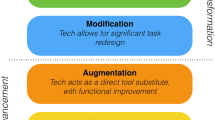Abstract
This article offers a detailed reading Gascoigne and Thornton’s book Tacit Knowledge (2013), which aims to account for the tacitness of tacit knowledge (TK) while preserving its status as knowledge proper. I take issue with their characterization and rejection of the existential-phenomenological Background—which they presuppose even as they dismiss—and their claim that TK can be articulated “from within”—which betrays a residual Cartesianism, the result of their elision of conceptuality and propositionality. Knowledgeable acts instantiate capacities which we might know we have and of which we can be aware, but which are not propositionally structured at their “core”. Nevertheless, propositionality is necessary to what Robert Brandom calls, in Making It Explicit (1994) and Articulating Reasons (2000), “explicitation”, which notion also presupposes a tacit dimension, which is, simply, the embodied person (the knower), without which no conception of knowledge can get any purchase. On my view, there is no knowledgeable act that can be understood as such separately from the notion of skilled corporeal performance. The account I offer cannot make sense of so-called “knowledge-based” education, as opposed to systems and styles which supposedly privilege “contentless” skills over and above “knowledge”, because on the phenomenological and inferentialist lines I endorse, neither the concepts “knowledge” nor “skill” has any purchase or meaning without the other.
Similar content being viewed by others
Notes
On colour-recognition, see McDowell (1994, Lecture III, sect. 5).
“Contexture” is taken from Heidegger (1988, 1–24, passim).
See also Taylor (2013).
On this holistic conception of the person, see Hacker (2007).
See Gascoigne and Thornton passim, but especially chapters 2 and 4 (passim; 76–77; 130).
On testimony and tacit knowledge, see Gascoigne and Thornton (183–89).
In different terms and contexts, David Lewin (2016), drawing on Taylor, explores the constitutive-affective role of the propositional frame. Quine (1963), Cavell (2002), and Brandom (2000) are but three philosophers who have shown the bankruptcy of the analytic/synthetic distinction. Cavell reminds us that preserving necessity is not the same as preserving analyticity.
This is one reason why those participants who are retrospectively credited as innovators and geniuses are often controversial if not rejected in their time. The innovator strains at the norms of their discourse, but without ever breaking entirely free of their reach.
McDowell (2007, 349), qtd Gascoigne and Thornton (164).
Aldridge (2015, ch.4).
References
Aldridge, D. 2015. A hermeneutics of religious education. London: Bloomsbury.
Brandom, R. 1994. Making it explicit: Reasoning, representing, and discursive commitment. Cambridge, MA: Harvard UP.
Brandom, R. 2000. Articulating reasons: An introduction to inferentialism. Cambridge, MA: Harvard UP.
Carman, T., and M.B.N. Hansen (eds.). 2005. The Cambridge companion to Merleau-Ponty. Cambridge: CUP.
Cavell, S. 2002. Must we mean what we say? Must we mean what we say? 1–43. Cambridge: CUP.
Christodoulou, D. 2014. The seven myths about education. Abingdon: Routledge.
Collins, 2004. Interactional expertise as a third kind of knowledge. Phenomenology and the Cognitive Sciences 3: 125–143.
Collins, 2010. Tacit and explicit knowledge. Chicago: University of Chicago Press.
Collins, and R. Evans. 2007. Rethinking experience. Chicago: University of Chicago Press.
Derry, J. 2013. Can inferentialism contribute to social epistemology? Journal of Philosophy of Education. 47(2): 222–235.
Derry, J. 2016. Inferentialism and education. Paper presented at PESGB annual conference, New College, Oxford, 1–3 April 2016.
Dreyfus, H. 1993. Heidegger’s critique of the husserl/searle account of intentionality. Dreyfus (2014). 76–91.
Dreyfus, H. 2005a Overcoming the myth of the mental: how philosophers can profit from the phenomenology of everyday expertise. Dreyfus (2014). 104–125.
Dreyfus, H. 2005b. Merleau-Ponty and recent cognitive science. In ed. Carman & Hansen, 129–150.
Dreyfus, H. 2013. The myth of the pervasiveness of the mental. ed. Schear, 15–40.
Dreyfus, H. 2014. In Skillful coping: Essays on the phenomenology of everyday perception and action, ed. Mark A. Wrathall. Oxford: OUP.
Gascoigne, N., and T. Thornton. 2013. Tacit knowledge. Durham: Acumen.
Hacker, P.M.S. 2007. Human nature: The categorial framework. Oxford: Wiley-Blackwell).
Heidegger, M. 1962. Being and time (trans: John Macquarrie and Edward Robinson). Oxford: Blackwell.
Heidegger, M. 1988. The basic problems of phenomenology. (trans: Richard Hofstadter). Indiana: Indiana UP.
Hirsch, E.D. 1988. Cultural literacy: What every american needs to know. New York: Vintage.
Lewin, D. 2016. ‘The sky is not a cow’: Interpreting religion beyond the propositional frame. Paper presented at PESGB Annual Conference, New College, Oxford, 1–3 April 2016.
McDowell, J. 1994. Mind and world. Cambridge, MA: Harvard UP.
McDowell, J. 2007. Response to Dreyfus. Inquiry 50 (4): 366–370.
McDowell, J. 2013. The myth of the mind as detached. ed. Schear, 41–58.
Merleay-Ponty, M. 1966. The structure of behaviour. (trans. A.L. Fisher). 2nd Ed. Boston: Beacon P.
Peregrin, J. 2014. Inferentialism: Why rules matter. Basingstoke: Palgrave.
Pippin, R. 2013. What is ‘conceptual activity’? In ed. Schear, 91–109.
Polanyi, M. 2009. The tacit dimension. Chicago: University of Chicago Press.
Policy Exchange 2015. The annual lecture with E.D. Hirsch. http://policyexchange.org.uk/modevents/item/the-annual-education-lecture-with-e-d-hirsch. Retrieved 24 April 2016.
Quine, W.V.O. 1963. Two dogmas of empiricism. From a logical point of view, 2nd ed, 20–46. New York: Harper.
Ross, G. 2008. An interview with Harry Collins. American Scientist [online]. http://www.americanscientist.org/bookshelf/pub/an-interview-with-harry-collins. Retrieved 25/11-15.
Schear, J.K. (ed.). 2013. Mind, reason, and being-in-the-world: The McDowell-Dreyfus debate. London: Routledge.
Taylor, C. 2005. Merleau-Ponty and the epistemological picture. In ed. Carman & Hansen, 26–49.
Taylor, C. 2013. Retrieving realism. In ed. Schear, 61–90.
Wrathall, M. 2014. Introduction: Hubert Dreyfus and the phenomenology of human intelligence. Dreyfus 2014. 1–22.
Acknowledgements
My thanks to the Philosophy of Education Society of Great Britain. Their Research Retreat marked the beginnings of what has grown into the present article.
Author information
Authors and Affiliations
Corresponding author
Additional information
From January 2018 Oliver Belas will be Lecturer in Education at University of Bedfordshire.
Rights and permissions
About this article
Cite this article
Belas, O. On Tacit Knowledge for Philosophy of Education. Stud Philos Educ 37, 347–365 (2018). https://doi.org/10.1007/s11217-017-9585-0
Published:
Issue Date:
DOI: https://doi.org/10.1007/s11217-017-9585-0




